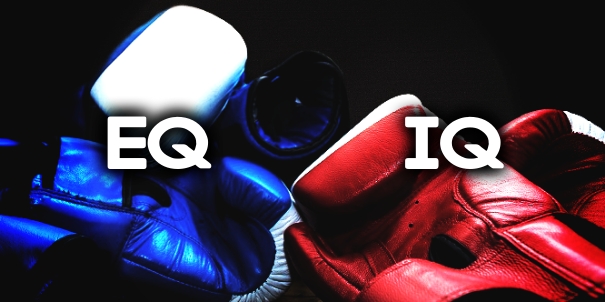Great leaders are scarce, so it’s a competitive advantage if an organization can look inside its own hallways to identify the next Elon Musk, Sheryl Sandberg, Sergey Brin or Beth Comstock. But new research suggests that business leaders could be looking for the wrong things.
There’s an age-old grudge match to prove the most important ingredient for great leadership. One side fights for intelligence and brains. The other for social savvy and people skills.
The bout takes place in research circles, and on the streets of global business. No champion has been crowned, and there’s research to support both positions. But CEOs and business leaders, prone to strong opinions, take sides. From their opposing stances, they battle to control the leadership talent that thrives in their organizations.
Let’s look at the contenders.
Fighting in the red corner: the IQ team. Steely-eyed and focused, this leadership style emphasizes cognitive ability or intelligence. Success comes from brain power, not people skills. Decades of research suggests that smarter leaders have more success. They process information faster, and make better decisions, generating better outcomes. Intelligence beats social skill. If you’re smart you can lead, and all the aplomb in the world won’t produce better business judgments. Be bright, or go home.
Fighting in the blue corner: the EQ team. Socially savvy and diplomatic, this style emphasizes relationship capital over intellectual horsepower. Emotional Intelligence (EQ) proponents like Daniel Goleman and Adele Lynn have made compelling arguments that mastering emotions, both yours and others’, rules. They point to the common tales of leaders whose brilliance was proclaimed only shortly before crashing and burning due to the lack of empathy and social expertness to work with others. A smart mind, the blue corner contends, will get you nowhere without the EQ to apply it.
And this is where the fight inevitably ends — in a draw. It’s the one-two punch of IQ and EQ that makes for great leadership. That perspective wouldn’t be wrong, but it turns out there’s more to it. New research looking at objective assessments of more than 15,000 leaders across the globe offers insight into when IQ and EQ matter most.
The research didn’t simply look at test scores or survey responses. Leaders were observed in action as they led their way through a complex business simulation — coaching others, influencing partners, solving urgent dilemmas, and crafting long-range business plans. IQ and EQ were measured in advance, and scores were used to predict observed behavior patterns.
It comes as no surprise that IQ wins the complex business decision-making rounds: business savvy and financial acumen. But in the people-oriented rounds — cultivating networks and leading teams — EQ clearly dominates.
There were also surprises. While many assume that EQ dictates effectiveness in Influence, the data showed that IQ was the clear winner. Persuading someone else to adopt your point of view seems to be somewhat more about the ability to convey a clear business case with rational logic than it is about managing a positive relationship.
Also unexpected was that EQ proved the more significant predictor of execution. It appears that marshalling people to a common direction and coordinating group effort is somewhat more dependent on interpersonal effectiveness than brains.
So how do we pick a winner in leadership effectiveness when the only clear outcome is that it depends? Let’s start with the obvious losers: those who oversimplify.
Leadership is complex and dynamic. No single characteristic can sustain a leader for very long, not in today’s chaotic world. So organizations should be wary of fixating on one asset or another. Admiring the brilliant but emotionally obtuse entrepreneur is dangerous. Leaders need people skills to lead teams, build networks and run a successful business. Assess the full profile for leadership, and push back on stakeholders who reduce people to a single feature.
The real winners recognize two things. First, EQ can be trained while IQ cannot. It’s not easy, but for leaders who are motivated and focused, EQ training and coaching can help them identify the triggers that bring out their most unproductive behaviors. Developing EQ also means confronting one’s worries and spending time analyzing and anticipating emotions and social cues that may often be missed. With practice, leaders can learn to anticipate sensitive situations and hone alternative approaches.
Second, winners analyze the business landscape with as much rigor as they analyze people. The game changes constantly, altering the relative importance of EQ and IQ. Sure, it’s true that a mix is ideal, but no leader is perfect. So the winners pay close attention to how the game is changing, and make adjustments.
Individual leaders can work to adapt their approaches and seek help when the job calls on their weaker areas. Business leaders can staff teams with complementary capabilities to ensure a balance of skills across the team. Talent leaders can supply accurate, objective data about EQ, IQ, and other capabilities relevant to leadership success to enable better decision making and help bridge the gap for those who aren’t armed with the emotional intelligence to succeed where EQ is critical.
Ultimately, leaders can’t choose between EQ and IQ. The next leadership stars will start with accurate insight about their own EQ and IQ. They’ll then seek to learn what is required to succeed in their unique business contexts, and work to develop and apply their individual strengths to respond and win.
Matt Paese is a vice president of succession management and c-suite services for Development Dimensions International, or DDI. He is the co-author of “Leaders Ready Now” and “Grow Your Own Leaders.” In his work at DDI, Paese consults with senior leaders to design and implement strategic organizational talent initiatives, including succession management, CEO succession, executive assessment, executive coaching, development and team building. His insights have been featured by media outlets such as the Wall Street Journal, Fortune, and the Financial Times.
If you enjoyed this article, join SmartBrief’s e-mail list for our daily newsletter on being a better, smarter leader.
